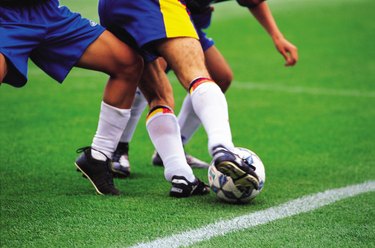
Proper nutrition before a big soccer match can mean a superior performance. You'll have the energy to stay strong through both halves, avoid game-altering cramps and you won't feel flat as you play. What you eat in the hours before playing depends on the time of day, your personal preferences and how long you have before game time. Focus on carbohydrates to boost your energy.
Meal Composition
Video of the Day
Whether your game is early or late in the day, aim to fuel up about three hours in advance, with a satisfying meal. The meal should contain mostly easily digested carbohydrates, which translate into energy, as well as small amounts of fat, fiber and protein. Fat and protein digest more slowly, so they don't provide immediate energy. Too much fiber can trigger digestive distress, bloating and gas come game time -- symptoms that definitely slow you down.
Video of the Day
Sample Meals
If you have a morning game, try cereal with milk, toast and orange juice; scrambled eggs with a large waffle and strawberries; or a bagel with peanut butter and banana as breakfast options. If your game falls later in the afternoon, lunch will be your last pre-game meal. Have a turkey sandwich on white bread with juice and pretzels; pasta with tomato sauce with bread; or a generous serving of rice with a small serving of chicken and roasted carrots. Allow your personal preferences to dictate what you choose -- don't choke down a food you hate simply because it's good for you. You'll also find, over time, which foods work best for your stomach and your performance. Experiment during training, though, not before a big game. A meal experiment could mean digestive problems or a poor performance during competition.
Timing Techniques
Consume your large meal of 300 to 500 calories three to five hours before game time. If you have less time before you play and need a meal, choose a 200- to 300-calorie meal that's easy to digest. Options include fruit salad with a handful of almonds, yogurt with raisins, graham crackers and juice or an energy bar. If you've postponed your meal until an hour before start time, a meal of 100 to 200 calories is safest. For this, a cereal bar, a banana or even a bottle of sports drink will have to suffice.
Maintain Good Nutrition
Eating a quality pregame meal won't make up for poor nutritional choices in the days and weeks leading up to the match. Carbohydrate-rich meals consumed in the days before your game fills the stores of glycogen -- a source of energy -- in your muscles. You call on these stores during continuous play out on the field. Proper nutrition during training enables you to make the most of each session so you build a strong foundation, from which you can pull during a match.